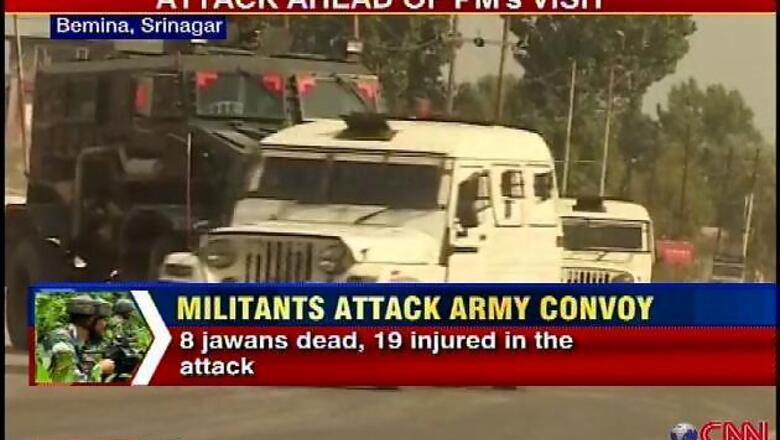
views
After a more-than-decade slide in terror-related incidents in the Valley, the first six months of 2013 show a sharp upward climb in such incidents. Yesterday's attack in which eight soldiers were killed and 19 injured is possibly the most audacious strike in recent years. Are these signs of things to come after the US pullout from Afghanistan in 2014 just like it happened after the Soviet pullout in late 1980s? How can India respond? Senior journalist Praveen Swami joined IBNLive readers for an interaction on the issue.
Q. Just today, both Sonia and Manmohan vouched terror incidents lowest in recent days. your comments? Asked by: Lakshmanan
A. Hi! Well, the fact is that overall, violence in Jammu and Kashmir is at its lowest level since 2002. It has declined year on year since then. But this year, for the first time since 2002, fatalities of Indian security force personnel have gone up-they're already higher this year than in all of 2013. This is obviously a matter of concern-you can read more about the implications at IBN Live's sister website, Firstpost (http://www.firstpost.com/india/is-mondays-attack-in-srinagar-a-new-dawn-for-the-kashmir-jihad-904029.html)
Q. Will we be seeing Taliban led governments post 2014 US pullout emerging in Afghanistan & Pakistan? Asked by: Prabhu
A. It's unlikely in the short term-as long as funding for the Afghan National Army continues to come in through the international community, the regime in Kabul will be reasonably secure, in my view. In the countryside, though, there will undoubtedly be killings-violence against civilians by insurgents is already higher in the first six months of this year compared to the first six months of last year. There's probably a lot of suffering ahead for Afghans, who have already paid a terrible price. In Pakistan, too, there's no end in sight to terrorist violence
Q. We saw recently the budget allocation of the Pakistan's Punjab state for the terror group,claiming to be a NGO. Why do we not put pressure on USA to act against such fundings in Pakistan? Asked by: sundar1950in
A. The question is-what is India going to do to put pressure on Pakistan. The United States does a lot-but it also has things it wants from Pakistan, like help with the Afghan Taliban. It's only going to do so much for us.
Q. How long the Government of India and the so called Secularists try to fool the People of India by describing that Kashmir Problem is due to lack of Education and Development? Is it not the Historical Hindu Muslim Enmity? Asked by: Raghava Rao Karavadi
A. Raghava, I suggest you read a few books on Hindu-Muslim relations in Kashmir, which are quite complex and have changed a lot over time, before coming to any simplistic conclusions. Chitralekha Zutshi's Languages of Belonging is a good starting point; there are lots of others.
Q. Do you think terror is still big in Kashmir? Asked by: abilash
A. No, its not big--in fact, in statistical terms, Jammu and Kashmir is a lot safer than many states of the union. Terrorism is a continued threat, though, because the state is right next to one of the most volatile regions in the world, and there are many unresolved political issues.
Q. The USA pullout on AFPAK will get the Taliban and co to bother about AFPAK region and may not worry about Kashmir. You see a scenario like that? Asked by: sundar1950in
A. Sundar, I think think the Afghan Taliban and the Tehreek-e-Taliban Pakistan will indeed stay focussed on AfPak--so there's no direct threat by them to Jammu and Kashmir. The worry is that the Pakistan army will try to deflect the jihadi constituency inside Kashmir--which they fear is backing the TTP--towards Kashmir. Also, the US, which has had a moderating influence on Pakistan, may not be able to exercise quite so much leverage over it after 2014.
Q. The terror related incidents are all based on religious fundamentalism. Why do our leaders shy away from this fact and do not build confidence in moderate Kashmiris and get the majority population to bring peace in the valley? Asked by: sundar1950in
A. Well, firstly, all terrorism incidents aren't about religion: Maoists in India aren't fighting for a religion; ethnic secessionists in the North-East aren't fighting for a religion; the LTTE in Sri Lanka or FARC in Colombia weren't fighting for religion. Secondly, a lot of leaders are trying to build confidence in Jammu and Kashmir--though how much success they've had is a separate debate.
Q. There is an argument that US is indirectly supporting terror by unnecessary intervention. However in an article by Fareed Zakaria written long back, he argues the arab societies have not been able to integrate with the modern world and have not built a competent society and that vacuum has been filled by the radicalization of such society. Your opinion on the exact reason of terrorism and the solution thereof. Asked by: Raghav
A. Raghav, in my opinion, there's no such thing as "Arab societies": you can't talk of the situation in Tunisia, Egypt, Syria and Saudi Arabia all in one breath, because the conditions and history in each are all very different. The one common thread in many is that authoritarian regimes suppressed liberal and progressive groups. That created a vacuum, which religious parties were able to exploit. Remember also that the Islamists are, in a sense, modernist--i.e., they reject the traditionalist clergy and the Islam it represents. I think the long -term solution lies in greater democratisation, but achieving that will probably involve decades of struggle by people in West Asia.
Q. Sir, Is the US lost the war on terror after fighting for 10 years in Afghanistan. Asked by: Harish
A. Harish, I don't think the US has lost the war. Barack Obama's government believes it has reduced al-Qaeda, at least to the point where its ability to launch a large-scale attack against the United States has diminished. It thinks the United States' immediate post-9/11 objective has been met, and there's no point waging an endless counter-insurgency or being drawn into a war with Pakistan, where the jihadists opposing it are sheltered. Now, if Afghanistan and Pakistan descend into chaos, its their problem, and that of the region-not the United States.
Q. Are we incapable of fighting terror? Why shall we be bothering about US pull out? What does it mean? Our leader sitting at the centre as well as in states are impotent and spine less, when it comes to national security and integrity. Are we a nation who cannot provide security to its people and depends on US presence in Afganistan? Is it the case after spending so much money on a huge military (3rd largest) and a big law-enforcement agency? Is the US only country that can provide security both inside and outside America? We should be ashamed of discussing such scenario. Do we deserve to be called as a sovereign country, where we need America's presence in Afganistan to be protected against terror in particular? Asked by: Satya
A. Words like "impotent" and "spineless" are great if you're a politician fighting an election campaign, but what do they mean? India has fought many insurgencies, some successfully, using a variety of tools, both political and military. Even in Jammu and Kashmir, the insurgency has diminished greatly. The United States withdrawal will have consequences for us, which people are thinking about. What's not so clear is what India's options are: for example, do we go to war the next time there's a terror attack, knowing, say, that it will at the very least wipe 2 or 3% off our GDP for the next decade? Do we risk a nuclear war in which 1,000,000 people will die to retaliate against terror attack in which 100 people die? There are other options, including intelligence-led options--but in the real world, making and executing policy is a lot tougher than mouthing off in a chat-room.
Q. Sir is the govt shying away from accepting the increased influence of the extremists. Instead of interacting directly with the people of Kashmir and gaining back their confidence by bowing down to the demands of hardliners is it indirectly encouraging the jihadi and separatist elements. And is it possible for the govt to have a tougher foreign policy when it comes to dealing with Pakistan. Asked by: Shiv
A. Firstly, I question your premise: I do not see any evidence that extremists in Kashmir are stronger than in the past. I think the government's long sought to buy-off jihadi elements in Kashmir. In my view, this has not been productive-but I can understand the logic behind it, which is that dividing your enemies makes them weaker. As things stand, there's a mounting threat because of instability across the border, which will have consequences for us.
Q. Is it right to say that the change in Pak govt has brought fresh tensions along the border? Should we consider the recent Rs 61 million for JuD (another name for LeT) is going to cause more harm than good? Pak govt has skirted the issue of terrorism by wrapping the monetary needs as basic facilities to help the local people. What necessary steps should India take to ward off or curb militancy? And how can we convince Kerry of the importance of Af-Pak relationship with Taliban? Asked by: EM
A. Well, obviously, Pakistani funding for the Lashkar-e-Taiba is not good news for India. Pakistan argues this funding gives it leverage over the Lashkar, allowing it to control their actions and stop attacks against India. Past experience gives Indians good reason to be suspicious about these claims. John Kerry is aware of Indian concerns-but remember, he's much more concerned about United States concerns than Indian concerns, as he should be. It's for India to deal with its problems, for which it needs a smart mix of intelligence-led coercive options and political intervention.




















Comments
0 comment